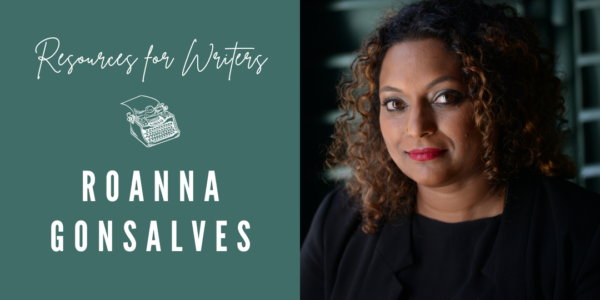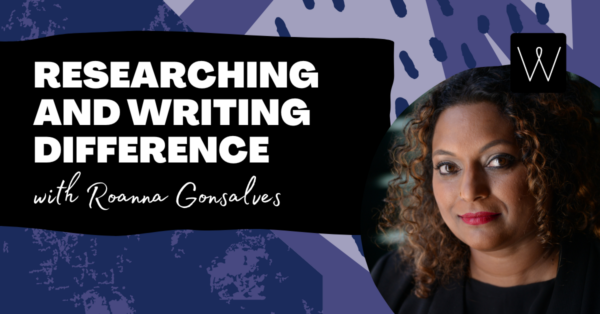
Ahead of her course, Researching and Writing Difference, Roanna Gonsalves shares a selection of resources for writers to consider when writing the stories of others.
“As writers, we must consider questions of freedom of speech and expression as being inextricably linked to questions of responsibility, positionality and context. These are ethical questions but they are also questions of craft, skill and imaginative labour. In order to tell the stories of our time, we often feel the need to create characters or narratives outside of our own lived experiences, whether this difference is related to race, ethnicity, gender, sexual orientation, class, disability, linguistic background, religious background, the rural-urban divide or any other category of identity,” Roanna writes.
“We are each a complex configuration of identities and our characters should reflect this. Above all, see your characters as individuals. Love them. Love even the awful perpetrators in your work. This is how you will create a powerful story.”
Resources on writing difference:
Read Roanna’s essay ‘Interrupting Intersectionality‘ in the Sydney Review of Books.
Listen to ‘The Limits of Imagination,’ podcast episode recorded at the 2022 Sydney Writers’ Festival.
Helpful guides:
The Australian Council for the Arts Protocols for using First Nations Cultural & Intellectual Property in the Arts.
Respectful Storytelling Practices, a resource written by the team at Terri Janke and Company for the Australian Society of Authors
On telling other people’s stories:
Read ‘30 years after Mabo, what do Australia’s battler stories – and their evasions – say about who we are?’, A 2022 essay by Jeanine Leane in The Conversation.
Read ‘Want to write the great Australian novel? You need to engage with Indigenous Australia first,’ a 2021 Guardian article by Anita Heiss.
Read Finding Eliza: Power and Colonial Storytelling, a 2016 book by Larissa Behrendt.
Listen to ‘Larissa Behrendt on Finding Eliza’, a 2020 interview on The Garret podcast.
Read ‘The Responsible Writer,’ a 2018 piece by Angela Savage for Writers Victoria.
Read ‘Who gets to write what?’, a 2016 article by Kaitlyn Greenidge for the New York Times.
Read ‘Whose life is it anyway? Novelists have their say on cultural appropriation.’ A 2016 article with contributions by Hari Kunzru, Kamila Shamsie, Aminatta Forna, Nikesh Shukla and others, commenting on cultural appropriation and telling other people’s stories.
Best practices for when you get it wrong:
Read Hella Ibrahim’s 2018 publisher’s note on ‘Passport pains.’
Read this 2021 statement from Yoda Press after discovering that one of their authors had withheld crucial information.
Roanna Gonsalves is the author of The Permanent Resident (UWAP) published in India and South Asia as Sunita De Souza Goes To Sydney (Speaking Tiger). The book won the NSW Premier’s Literary Award Multicultural Prize 2018 and was longlisted for the Dobbie Literary Award 2018. Her writing has been compared to the work of Alice Munro and Jhumpa Lahiri. Her four-part radio series On the tip of a billion tongues, commissioned and broadcast by ABC RN’s Earshot program, is a portrayal of contemporary India through its multilingual writers.
Roanna holds a PhD and has been teaching and supervising creative writing students of all ages within communities as well as at schools and at New York University Sydney, UNSW, Western Sydney University and Macquarie University. She is a recipient of the Prime Minister’s Australia Asia Endeavour Award and is co-founder co-editor of Southern Crossings. She has been an invited keynote speaker and panellist at numerous literary events. She is a recipient of The Bridge Awards’ inaugural Varuna – Cove Park Writing Residency 2019 in Scotland, and was part of the Australia Council for the Arts’ India Literature Exploratory delegation 2020. She works as a lecturer in creative writing at UNSW Sydney.
Enrol in Researching and Writing Difference with Roanna Gonsalves, at Writing NSW on Saturday 10 August, 10 am – 4 pm.
If you want to be the first to read great advice from our incredible tutors, subscribe to our weekly e-newsletter Newsbite.
More from Writing NSW
Check out our full range of in-person writing courses in Sydney, our online writing courses and our feedback programs to see how we can help you on your writing journey. Find out about our grants and prizes, as well as writing groups across NSW, and sign up to our weekly newsletter for writing events, opportunities and giveaways.

